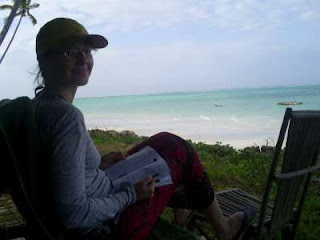


Above are pictures from Joanna's visit to Zanzibar.
Below are pictures of Carla and I with Margaret Mary, our shadow, and at bottom is her at site announcements.
a-400.jpg)
a-400.jpg)
The sometimes daily, sometimes weekly, sometimes monthly details of one man's life.



a-400.jpg)
a-400.jpg)






Greetings from Kibakwe. We're only about a month or two away from our landscape going from green to brown. The desert has already started reclaiming Kibakwe by occupying the recently harvested fields. Even though the daytime temperature doesn't fluctuate much year-round, Tanzanians complain about how cold it is right now(50s overnight, 80s during the day). Honestly, this is close to being my ideal climate, but without seasonal change it gets a little confusing as to what time of year it is.
Well, the past couple of months have been busy. Carla and I both succeeded in organizing and conducting two one-day workshops on the topic of HIV/AIDS education. Each Training Of Trainers(TOT) was conducted at the secondary school on consecutive Saturdays in May. The first one was for HIV/AIDS support groups which are composed mostly of concerned members of the community with little no formal education. They absolutely loved the seminar, found it to be really helpful, and were so appreciative of the opportuntiy to learn. The second group was the Kibakwe area primary and secondary school teachers and they were more difficult to please. First of all, there were a few that voiced their disappointment in not receiving a posho or sitting allowance to attend the workshop. The posho system is one of the main obstacles to development in Tanzania. Most Tanzanians with any amount of education beyond secondary school or in any position of authority automatically expect to be paid(posho) to attend seminars and workshops, very different from the US where attendees are the ones to pay. Secondly, there was one primary school teacher that expressed her displeasure the night before the seminar when she discovered there would be no meat offered with lunch the next day. She actually called me on my cell phone to complain about a free meal. During the workshop itself, there was a small portion of the group of teachers that seemed really interested in and attentive to what was being presented. I have much more faith in the community members to educate others about HIV/AIDS than in the teachers. Overall, though, I felt that the training events can be counted as a success. Even if many of the people don't do any teaching, the materials are out there in the community for people to read themselves. Over two workshops, there were 72 attendees, and each one got four books on HIV/AIDS, life skills, nutrition, and nutrition for children living with HIV/AIDS. That makes 288 books that are, hopefully, in circulation in Kibakwe right now.
Soon we'll be going on vacation for a bit since our friend Joanna is coming for a visit in the next couple of weeks. We'll pick her up from the airport in Dar Es Salaam, then to Zanzibar for some beach time, back to the village for a while, up North to Arusha, Ngorongoro Crater and Tarangire Park, and finally back to Dar. The past weeks have been like anticipating summer break and our TOTs were like our final exams. It will be good and bad to get away from the village for a while. Good to see our friend that we haven't seen in over a year and travel to cool places and eat good food, and; bad to be away from our house, our neighbors, our garden, and our cat. Right now in Kibakwe most people are at their farms harvesting peanuts, corn, and sunflowers. Once the harvest is done, most Kibakweans won't have anything to do until October or November when they will prepare their farms for the next growing season. Starting in July will be the perfect time to start planning our next projects since everyone will be around with nothing to do. However, nothing to do also means lots of time to hang out and get drunk, so I'm trying to be optimistic. On the agenda right now for possible projects is an HIV/AIDS awareness mural, an HIV/AIDS video series to be held at the secondary school, an English club/class at the secondary school, a sewing club for secondary school orphans, gardens at the primary and secondary schools, and trying to rebuild a better, larger water intake.
I'm hoping that our little vacation with Joanna will recharge our batteries for the upcoming work. And here it is, the request for donations. If anyone wants to send us any really simple kids' books or English flash cards, that's what we're looking for right now. Also, if anyone has any books on drawing or Art History, my drawing club would love them. Thank you all for your continued generosity.

















